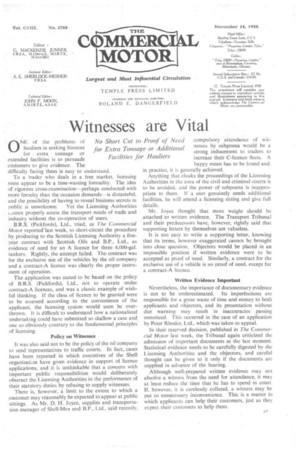Witnesses are Vital
Page 39

If you've noticed an error in this article please click here to report it so we can fix it.
• r,NE of the problems of kJ hauliers in seeking licences for extra tonnage or extended facilities. is to persuade customers to give evidence. The difficulty facing them is easy to understand.
To a trader who deals in a tree market, licensing must appear to be a time-wasting formality. The idea of rigorous cross-examination—perhaps conducted with more ferocity than the occasion demands—is distasteful, and the possibility of having to reveal business secrets in public is unwelcome. Yet the Licensing Authorities c...tnnot properly assess the transport needs of trade and industry without the co-operation of users.
B.R.S. (Pickfords), Ltd., . tried, as The Commercial Motor reportedlast week, to short-circuit the procedure by producing to the Scottish Licensing Authority a five • year contract with Scottish Oils and B.P., Ltd., as evidence of need for an A licence for three 4,000-gal. tankers. Rightly, the attempt failed. The contract was for the exclusive use of the vehicles by the oil company and a contract-A licence was clearly the proper instrument of operation.
The application was stated to be based on the policy of B.R.S. (Pickfords), Ltd., not to operate under contract-A licences, and was a classic example of wishful thinking, If the class of licence to be granted were to be assessed according to the convenience of the applicant, the licensing system would soon be overthrown. It is difficult to understand how a nationalized undertaking could have submitted so shallow a case and one so obviously contrary to the fundamental principles of licensing.
Policy on Witnesses It was also said not to be the policy of the oil company to send representatives to traffic courts. In fact, cases have been reported in which executives of the Shell organization have given evidence in support of licence applications, and it is unthinkable that a concern with important public responsibilities would deliberately obstruct the Licensing Authorities in the performance of their statutory duties by refusing to supply witnesses.
There is, however, a limit to the extent to which a customer may reasonably, be expected to appear at public sittings. As Mr. D. H. Joyce, supplies and transportation manager of Shell-Mex and B.P.. Ltd., said recently. compulsory attendance of witnesses by subpoena would be a strong inducement to traders to increase their C-licence fleets. A happy mean has to be found and. in practice, it is generally achieved.
Anything that cloaks the proceedings of the Licensing Authorities in the aura of the civil and criminal courts is to be avoided, and the power of subpoena is inappropriate to them. If a user genuinely needs additional facilities, he will attend.a licensing sitting and give full details.
Mr. Joyce thought that more weight should be attached to written evidence. The Transport Tribunal and their predecessors have, however, rightly said that supporting letters by themselves are valueless.
It is too easy to write a supporting letter, knowing that its terms, however exaggerated cannot be brought into close question. Objectors would be placed in an impossible position if written evidence were to be accepted as proof of need. Similarly, a contract for the exclusive use of a vehicle is no proof of need, except for a contract-A licence.
Written Evidence Important Nevertheless, the importance of documentary evidence is not to be underestimated. Its imperfections are responsible for a great waste of time and money to both applicants and objectors, and its presentation without due warning may result in inaccuracies passing unnoticed. This occurred in the case of an application by Peter Rhodes, Ltd., which was taken to appeal.
In their reserved decision, published in The Commercial Motor last week, the Tribunal again criticized the admission of important documents at the last moment. Statistical evidence needs to be carefully digested by the Licensing Authorities and the objectors, and careful thought can be given to it only if the documents are supplied in advance of the hearing.
Although well-prepared written evidence may not absolve a witness from the need for attendance, it may at least reduce the time that he has to spend in court. If, however, it is carelessly collated, a witness may be put to unnecessary inconvenience. This is a matter in which applicants can help their customers, just as they expect their customers to help them.




















































































































